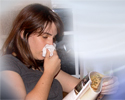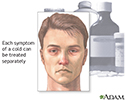Colds and the flu - what to ask your doctor - adult
What to ask your doctor about colds and the flu - adult; Influenza - what to ask your doctor - adult; Upper respiratory infection - what to ask your doctor - adult; URI - what to ask your doctor - adult; H1N1 (Swine) flu - what to ask your doctor - adult
Many different germs, called viruses, cause colds. Symptoms of the common cold include:
- Cough
- Headache
- Nasal congestion
- Runny nose
- Sneezing
- Sore throat
The flu is an infection of the nose, throat, and lungs caused by the influenza virus.
Many flu symptoms are similar to those of a common cold. Flu symptoms most often include fever, muscle aches, and fatigue. Symptoms can also include vomiting and diarrhea. Many of these symptoms are the same as for COVID-19.
Below are some questions you may want to ask your health care provider to help you take care of your cold or flu.
Questions
What are the symptoms of a cold? What are the symptoms of the flu? What are the symptoms of the COVID-19? How can I tell them apart?
- Will I have a fever? How high? How long will it last? Can a high fever be dangerous?
- Will I have a cough? Sore throat? Runny nose? Headache? Other symptoms? How long will these symptoms last? Will I be tired or achy?
- How will I know if I have an ear infection?
- How will I know if I have pneumonia?
- When should I get tested for COVID-19?
Can I make other people sick? How can I prevent that? What should I do if I have a young child at home? How about somebody who is older?
When will I start to feel better?
What should I eat or drink? How much?
What medicines can I buy to help with my symptoms?
- Can I take aspirin or ibuprofen (Advil, Motrin)? How about acetaminophen (Tylenol)? How about cold medicines?
- Can my provider prescribe stronger medicines to help improve my symptoms?
- Can I take vitamins or herbs to make my cold or flu go away quicker? How do I know if they are safe?
Will antibiotics make my symptoms go away faster?
Are there other medicines that can make the flu go away faster?
How can I keep from getting a cold or the flu?
- Should I get a flu shot? What time of year should I get one? Do I need one or two flu shots every year? What are the risks of the flu shot? What are the risks for me if I do not get a flu shot? Does the regular flu shot protect against swine flu?
- Is a flu shot safe for me if I am pregnant?
- Will a flu shot keep me from getting colds all year long?
- Can smoking or being around smokers cause me to get the flu more easily?
- Can I take vitamins or herbs to prevent the flu?
References
Barrett B. The common cold. In: Goldman L, Cooney KA, eds. Goldman-Cecil Medicine. 27th ed. Philadelphia, PA: Elsevier; 2024:chap 329.
Centers for Disease Control and Prevention website. Seasonal flu vaccines. www.cdc.gov/flu/prevent/flushot.htm. Updated August 25, 2023. Accessed October 23, 2023.
Centers for Disease Control and Prevention website. Flu: what to do if you get sick. www.cdc.gov/flu/treatment/takingcare.htm. Updated December 15, 2022. Accessed October 23, 2023.
Ison MG, Lee N. Influenza. In: Goldman L, Cooney KA, eds. Goldman-Cecil Medicine. 27th ed. Philadelphia, PA: Elsevier; 2024:chap 332.
Tips on buying cold and flu medicines
Animation
The difference between a cold and the flu
Animation
Common cold
Animation
Cold remedies - illustration
Cold remedies
illustration
Tips on buying cold and flu medicines
Animation
The difference between a cold and the flu
Animation
Common cold
Animation
Review Date: 10/13/2023
Reviewed By: Linda J. Vorvick, MD, Clinical Professor, Department of Family Medicine, UW Medicine, School of Medicine, University of Washington, Seattle, WA. Also reviewed by David C. Dugdale, MD, Medical Director, Brenda Conaway, Editorial Director, and the A.D.A.M. Editorial team.







